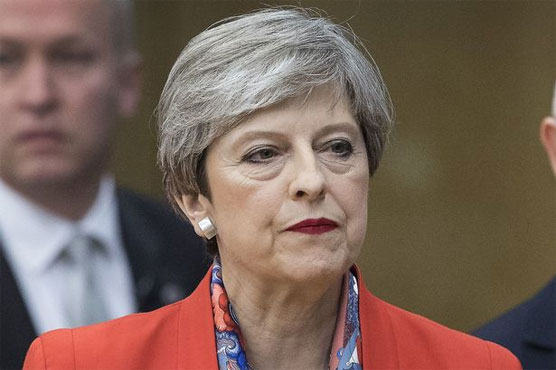British PM May to face fury of own MPs in battle to keep job

May's Conservatives unexpectedly lost their majority in parliament.
LONDON (AFP) - British Prime Minister Theresa May’s future was hanging in the balance Monday as she prepared for a showdown with angry MPs from her Conservative party following its disastrous performance in last week’s general election.
May’s Conservatives unexpectedly lost their majority in parliament in Thursday’s snap election, causing political chaos ahead of Brexit talks with the European Union, which are scheduled to start next week.
The prime minister is due to face MPs later Monday, where she could face demands to quit over her lacklustre campaign and decision to call the election in the first place.
May on Sunday unveiled her full cabinet, which will meet for the first time on Monday, making few changes as she vowed to cling on despite pressure to quit.
The visibly weakened premier denied she was feeling "shell-shocked" when quizzed in an interview with Sky News.
"What I’m feeling is that actually there is a job to be done and I think what the public want is to ensure that the government is getting on with that job," May said.
May’s party fell eight seats short of retaining their parliamentary majority, and is currently in talks with Northern Ireland’s ultra-conservative Democratic Union Party (DUP) -- which won 10 seats -- to forge an informal alliance.
‘Take control of borders’
Brexit minister David Davis on Monday insisted that the government still aimed to take Britain out of the EU single market.
"The reason for leaving the single market is because we want to take back control of our borders, they’re not compatible," he told BBC Radio.
He also said the government would still "walk away" with no deal if talks broke down on ending Britain’s four-decade membership of the bloc.
But Ruth Davidson, the pro-EU leader of the Conservatives in Scotland, called on May to "reopen" the government’s Brexit plans.
Davidson bucked the trend by helping the Tories win 13 seats in Scotland, but warned her MPs "will vote entirely as they believe they should" in parliament, raising doubts that the government could secure enough votes to pass a deal taking Britain out of the single market.
Criticised for relying on slogans during the election campaign, the prime minister’s Downing Street appearance saw her drop the "strong and stable" leadership mantra.
After the opposition Labour party made hefty election gains by focusing heavily on national issues, May listed areas such as education and housing as top priorities.
‘Dead woman walking’
Former finance minister George Osborne, who May sacked after taking office following the Brexit vote last June, on Sunday said May was now a "dead woman walking".
But the prime minister said she had a busy schedule ahead, with a cabinet meeting on Monday and talks with French President Emmanuel Macron the following day.
Brexit will likely be on the agenda at the Paris meeting, after May confirmed she will stick to the timetable of negotiations.
May tried to reassert her shattered authority at the weekend by announcing her new cabinet -- with no changes among her top team.
In a surprise move, Michael Gove was appointed environment and agriculture minister less than a year after the prime minister sacked him as justice minister.
May has shown little public contrition for the electoral gamble that backfired spectactularly, but was forced to accept the resignations of her two top aides -- reportedly a requirement by cabinet colleagues for allowing her to stay in office.
On Monday, she faces members of the Conservatives’ 1922 Committee, which can trigger a vote of confidence in a party leader if it receives letters from 15 percent of the party’s MPs.
They are expected to make demands on Brexit negotiations and any deal with the DUP.
DUP deal slammed
With the new government set to present its legislative programme to parliament on June 19, the clock is ticking on efforts to bolster the Conservatives’ position.
DUP leader Arlene Foster said there had been "very good discussions" so far and she would travel to London to meet May on Tuesday.
Defence Secretary Michael Fallon said the government was not looking at a formal coalition but would seek assurances that the DUP would vote with May "on the big things" such as the budget, defence issues and Brexit.
He stressed he did not share their ultra-conservative views on issues such as abortion and homosexuality, which have caused disquiet among many Conservatives.
More than 720,000 people have signed a petition condemning the proposed alliance, saying it is a "disgusting, desperate attempt to stay in power".
The deal has also caused consternation in Dublin, with Irish premier Enda Kenny warning such an alliance could upset Northern Ireland’s fragile peace.
London’s neutrality is key to the delicate balance of power in Northern Ireland, which was once plagued by violence over Britain’s control of the province.
May responded that the DUP deal "would provide stability and certainty for the UK going forward", her office said.

